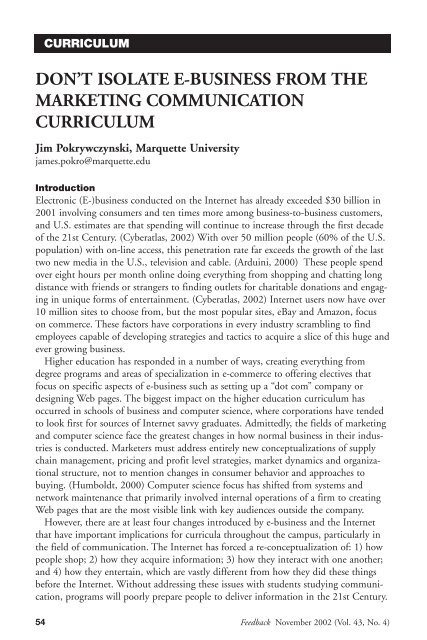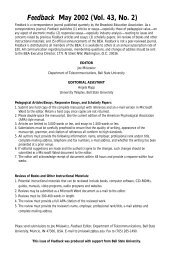CURRICULUMDON’T ISOLATE E-BUSINESS FROM THEMARKETING COMMUNICATIONCURRICULUMJim Pokrywczynski, Marquette Universityjames.pokro@marquette.eduIntroductionElectronic (E-)business conducted on the Internet has already exceeded $30 billion in2001 involving consumers and ten times more among business-to-business customers,and U.S. estimates are that spending will continue to increase through the first decadeof the 21st Century. (Cyberatlas, <strong>2002</strong>) With over 50 million people (60% of the U.S.population) with on-line access, this penetration rate far exceeds the growth of the lasttwo new media in the U.S., television and cable. (Arduini, 2000) These people spendover eight hours per month online doing everything from shopping and chatting longdistance with friends or strangers to finding outlets for charitable donations and engagingin unique forms of entertainment. (Cyberatlas, <strong>2002</strong>) Internet users now have over10 million sites to choose from, but the most popular sites, eBay and Amazon, focuson commerce. These factors have corporations in every industry scrambling to findemployees capable of developing strategies and tactics to acquire a slice of this huge andever growing business.Higher education has responded in a number of ways, creating everything fromdegree programs and areas of specialization in e-commerce to offering electives thatfocus on specific aspects of e-business such as setting up a “dot com” company ordesigning Web pages. The biggest impact on the higher education curriculum hasoccurred in schools of business and computer science, where corporations have tendedto look first for sources of Internet savvy graduates. Admittedly, the fields of marketingand computer science face the greatest changes in how normal business in their industriesis conducted. Marketers must address entirely new conceptualizations of supplychain management, pricing and profit level strategies, market dynamics and organizationalstructure, not to mention changes in consumer behavior and approaches tobuying. (Humboldt, 2000) Computer science focus has shifted from systems andnetwork maintenance that primarily involved internal operations of a firm to creatingWeb pages that are the most visible link with key audiences outside the company.However, there are at least four changes introduced by e-business and the Internetthat have important implications for curricula throughout the campus, particularly inthe field of communication. The Internet has forced a re-conceptualization of: 1) howpeople shop; 2) how they acquire information; 3) how they interact with one another;and 4) how they entertain, which are vastly different from how they did these thingsbefore the Internet. Without addressing these issues with students studying communication,programs will poorly prepare people to deliver information in the 21st Century.54<strong>Feedback</strong> <strong><strong>No</strong>vember</strong> <strong>2002</strong> (<strong>Vol</strong>. <strong>43</strong>, <strong>No</strong>. 4)
The shopping experience is revolutionarily different over the Internet. Shoppers canno longer touch the product, examine the package, know who sold it to them or whoto complain to if they are dissatisfied with the product nor make a purchase withcomplete confidence that their financial transaction was securely executed. All thesemissing pieces change the criteria consumers use to make purchases and change thetype of information they need in advance to persuade them to take the act ultimatelydesired by the seller. How they use the Internet experience with a product to modifytheir behavior at the traditional retail outlet is another re-conceptualization thatmarketing communicators must understand.How people acquire information has changed dramatically. Information crucial tomake purchasing decisions is now easier to access than ever. Take shopping for an automobileas an example. Twenty years ago all the information was in the hands of cardealers. Then Consumer Reports and other publications began revealing dealer markupson every make and model. But you still needed to visit a local library to review thesesources, then visit a dealership to negotiate the final price. Today, all this can be accomplishedon the Internet in a matter of an hour.At the same time, consumers must be more critical of Internet information becauseof the inherent biases of these sources and the lack of an objective “gatekeeper” toscreen out such biases. Consumers have already exercised a heightened “gatekeeper” roleas evidenced by the failure of most Internet banner advertising to date. (Hwang, 2000)Instead, the concept of “permission marketing” has emerged as a new way to approachconsumers with product information that they select. (Godin, 1999)Audiences are no longer at the mercy of timelines set by the news media to distributeinformation. Updated information can be accessed 24-7 (24 hours a day, 7 days aweek) on anything—-news (local, national or international), weather, financial, sports.Audiences can access the information they need when they want it. This reverses thepower of control long held by information distributors, which requires a better understandingof audiences and how they want this information packaged.The Internet has introduced new ways for people to interact with businesses,strangers, even each other. Instead of drawing conclusions about a business from itslocation, the appearance of the facility, and the people they encounter, an Internetvisitor uses “social associations” (Dominick, 1999) by assessing the business based onwhat links it has on its site, how easy it is to navigate to obtain the desired informationand how unobtrusive the requests are for personal information.Bulletin boards, chat rooms, personal websites and email have changed the waypeople interact with other people. The faceless, nameless anonymity offered by Internetcommunication has crumbled barriers of communication for people otherwisehampered by the inability to articulate thoughts and feelings. Internet communicationtends to be more open and personal regardless of who is the intended source—strangeror friend. Theories of interpersonal communication need reconsideration given thisnew communication environment.People entertain differently using the Internet. Entertainment can be sought on anindividual’s own timeline, not a television network’s or movie theater manager’s schedule.Content demands have changed as well, with live heart surgery, and the colonsurgery of NBC news anchorwoman Katie Couric drawing huge audiences. Thesechanges require new approaches to studying programming and entertainment, not toBEA—Educating tomorrow’s electronic media professionals 55
- Page 2 and 3:
Feedback November 2002 (Vol. 43, No
- Page 4 and 5:
CommentSWOT Analysis: Disney Consid
- Page 6 and 7:
without adding enough people to do
- Page 8 and 9: his favorite questions for prospect
- Page 10 and 11: The intellectual satisfaction you
- Page 12 and 13: Finding qualitative evidence via te
- Page 14 and 15: 2 Using a two-tailed Pearson Correl
- Page 16 and 17: • We need to expand digital editi
- Page 18 and 19: Two final points: While this paper
- Page 20 and 21: 1. As elsewhere in the profession,
- Page 22 and 23: EvaluationThere will be approximate
- Page 24 and 25: CLASSROOMEMPHASIZING ETHICS: PROMOT
- Page 26 and 27: “Avoiding Plagiarism” ( http://
- Page 28 and 29: CLASSROOMMULTIMEDIA FOR MORTALS: RE
- Page 30 and 31: Video files come in a variety of di
- Page 32 and 33: CURRICULUMDISMANTLING THE SILOS: MO
- Page 34 and 35: the Web on deadline and conceptuali
- Page 36 and 37: CLASSROOMADAPTING DIGITAL LEARNING
- Page 38 and 39: strategies. Unfortunately, most tex
- Page 40 and 41: Figure 2. Good Practice and the Enr
- Page 42 and 43: CLASSROOMSTUDENTS TACKLE SUPER BOWL
- Page 44 and 45: Usually, I urge students to use the
- Page 46 and 47: aggression with intelligence, when
- Page 48 and 49: e lost in sole reporting of undiffe
- Page 50 and 51: COMMENT“SCHOOL DAYS, SCHOOL DAYS,
- Page 52 and 53: CLASSROOMSWOT ANALYSIS: DISNEY CONS
- Page 54 and 55: analysis. SWOT is an acronym for St
- Page 56 and 57: Disneyland ResortDisney Vacation Cl
- Page 60 and 61: mention implications from legal and
- Page 62 and 63: viable media alternative to televis
- Page 64 and 65: management are needed to deliver th
- Page 66 and 67: Humboldt, Chris (2000). How E-comme
- Page 68 and 69: editing is a place of influence. St
- Page 70 and 71: COMMENTYO, YO, YO! THIS IS THE HIP-
- Page 72 and 73: REVIEWSchroeder, Sheila E. (2002).
- Page 74 and 75: ANNOUNCEMENTS2003-2004 Scholarship
- Page 76 and 77: ANNOUNCEMENTSBroadcast Education As
- Page 78: NEWSJohn Mark DempseyUniversity of
















